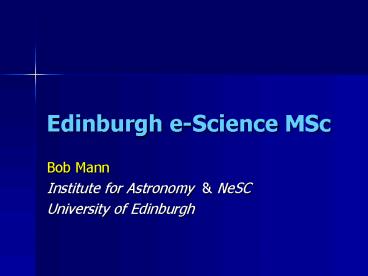Edinburgh eScience MSc PowerPoint PPT Presentation
1 / 13
Title: Edinburgh eScience MSc
1
Edinburgh e-Science MSc
- Bob Mann
- Institute for Astronomy NeSC
- University of Edinburgh
2
Overview of e-Science MSc
- Due to start in September 2005
- 15 students in the first year
- 80 students within five years
- Take broad view of e-Science
- Multi-disciplinary course
- Aiming at suiting a wide range of students
- Build on existing Edinburgh strengths
3
What kind of students?
- We see three types of students
- Science students needing to develop IT skills for
their future research - Computer scientists looking to future work in
scientific computing - Computer scientists looking to web and Grid
services in commercial IT - Challenge to satisfy all three types
4
What kind of course?
- Basic requirements
- Underlying principles and hands-on experience of
current technologies - Discipline in software engineering
- Range of options, given range of students
- Requires strength in computer science and in a
range of application areas
5
What can Edinburgh offer?
- Informatics
- Existing MSc offering a wide range of courses
- NeSC
- Expertise in training in e-science technologies
- EPCC
- HPC and mix of CS and application students
- Applications
- Physical, earth and life sciences, plus new
national Digital Curation Centre
6
Basic programme structure
- Semester 1 (Sep-Dec)
- Four mandatory courses
- Two optional courses
- Semester 2 (Jan-Mar)
- Four mandatory courses
- Two optional courses
- Semester 3 (Apr-Sep)
- Individual research project
Diploma
MSc
7
Mandatory courses
- Semester 1
- Distributed Computing for e-Science 1
- Scientific Software Engineering 1
- Introduction to Scientific Data
- Programming for e-Science
- Semester 2
- Distributed Computing for e-Science 2
- Scientific Software Engineering 2
- Topics in e-Science
- Project Preparation
8
Distributed Computing for e-Science 1 2
- Topics to include
- Models of distributed computation and their
appropriateness for different tasks - Generic problems in distributed computing
- Platform dependence, security, fault recovery,
resource discovery and unavailability - Hands-on experience of current packages
- Condor, web services, Globus Toolkit, etc
- To be taught by NeSC Training team
9
Scientific Software Engineering 1 2
- Topics to include
- Software development cycle
- From initial requirements to maintenance of code
- Benefits from disciplined software engineering
- Unified Modelling Language (UML)
- Its use in the design of object-oriented software
- Managing distributed software teams
- Development of distributed software
- Developing existing Informatics courses
10
Introduction to Scientific Data
- Topics to include
- The role of data in the scientific process
- Validation, reproducibility, provenance
- Passage from raw state to archived products
- Data management strategies
- Databases, files, XML, etc
- Metadata for data discovery integration
- Case studies from several disciplines
- Seek collaboration with Digital Curation Centre
11
Optional courses
- Three types of optional course
- Courses from existing MSc programmes
- e.g. Informatics, High Performance Computing
- New courses from application areas
- e.g. astronomy - The Virtual Observatory
- Preparing students to undertake projects in
several Schools within the University - Advanced (4th/5th year) undergrad. courses
- Wide range of existing options
12
Examples of individual study programmes
- Student wants to work in drug discovery
- Core, plus Bioinformatics 1 2, Applied
Databases and Learning from Data 1 - Student wants to be astronomer
- Core, plus Virtual Observatory, Astrophysical
Cosmology, Applied Databases, High Energy Astro. - Student wants to work in IT industry
- Core, plus Computer Networking, Computer
Graphics, Parallel Architectures, Parallel
Algorithms and Programs
13
Current status
- Anticipate first admissions in Sept 2005
- course approved at School College level
- awaiting rubber-stamping at University level
- Seeking funding to support students
- Priority in recent EPSRC CTA bid
- Marie Curie EST proposal in Dec (Dip.?)
- Student Awards Agency for Scotland (Dip.)
- Long-term goal
- All-Scotland (or all-UK?) collaboration

